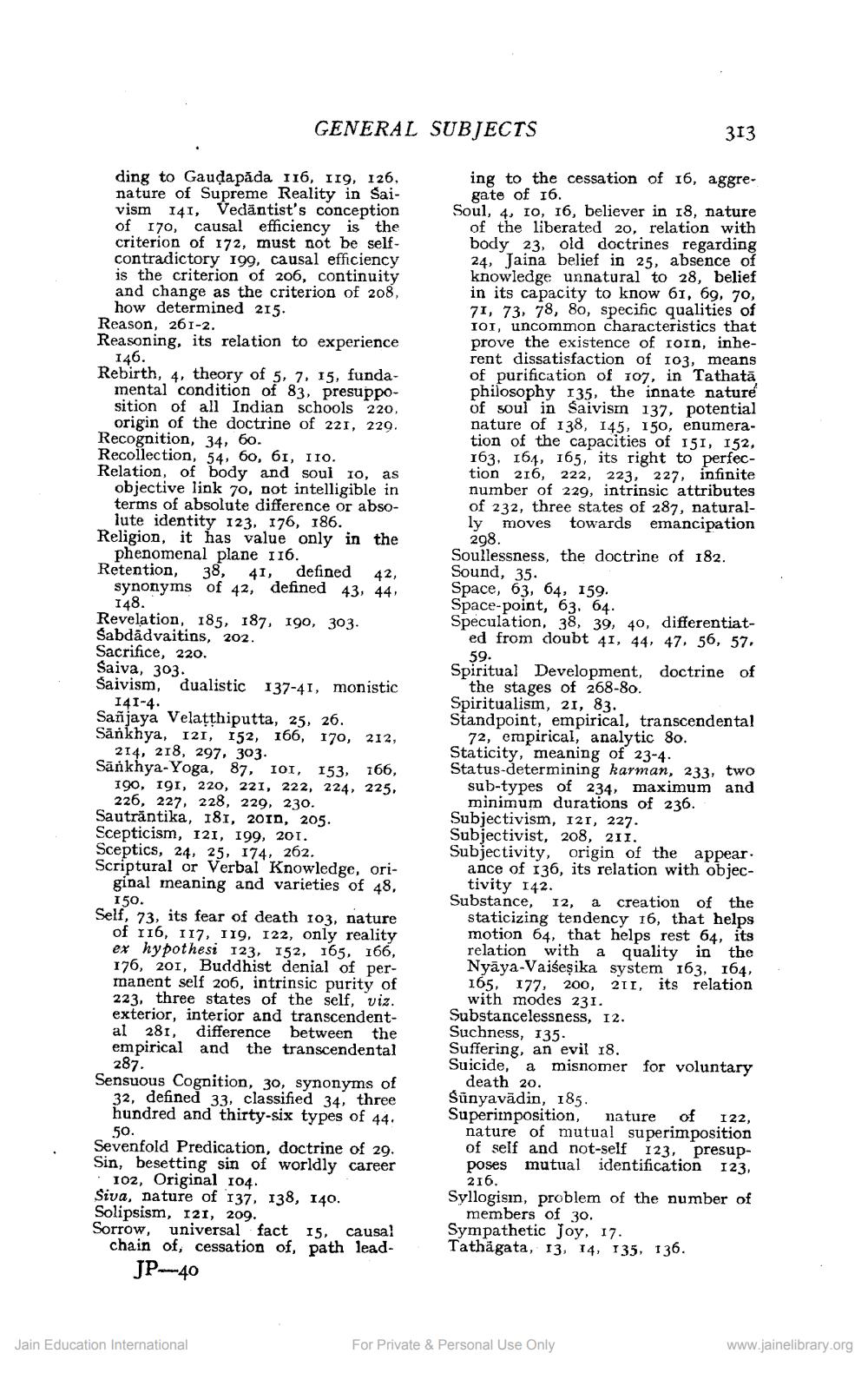________________
GENERAL SUBJECTS
313
ing to the cessation of 16, aggre.
gate of 16. Soul, 4, 10, 16, believer in 18, nature
of the liberated 20, relation with body 23, old doctrines regarding 24, Jaina belief in 25, absence of knowledge unnatural to 28, belief in its capacity to know 61, 69, 70, 71, 73, 78, 80, specific qualities of TOT, uncommon characteristics that prove the existence of coin, inherent dissatisfaction of 103, means of purification of 107, in Tathatā philosophy 135, the innate nature of soul in Saivism 137, potential nature of 138, 145, 150, enumeration of the capacities of 151, 152, 163, 164, 165, its right to perfection 216, 222, 223, 227, infinite number of 229, intrinsic attributes of 232, three states of 287, naturally moves towards emancipation
298.
ding to Gauda pada 116, 119, 126, nature of Supreme Reality in Saivism 141, Vedāntist's conception of 170, causal efficiency is the criterion of 172, must not be selfcontradictory 199, causal efficiency is the criterion of 206, continuity and change as the criterion of 208,
how determined 215. Reason, 261-2. Reasoning, its relation to experience
146. Rebirth, 4, theory of 5, 7, 15, funda
mental condition of 83, presupposition of all Indian schools 220,
origin of the doctrine of 221, 229. Recognition, 34, 60. Recollection, 54, 60, 61, IIO. Relation, of body and soul 1o, as
objective link 70, not intelligible in terms of absolute difference or abso
lute identity 123, 176, 186. Religion, it has value only in the
phenomenal plane 116. Retention, 38, 41, defined 42,
synonyms of 42, defined 43, 44,
148. Revelation, 185, 187, 190, 303. Sabdâdvaitins, 202. Sacrifice, 220. Saiva, 303 Saivism, dualistic 137-41, monistic
141-4 Sanjaya Velaţthiputta, 25, 26. Sänkhya, 121, 152, 166, 170, 212,
214, 218, 297, 303. Sankhya-Yoga, 87, 101, 153, 166,
190, 191, 220, 221, 222, 224, 225,
226, 227, 228, 229, 230. Sautrăntika, 181, 2010, 205. Scepticism, 121, 199, 201. Sceptics, 24, 25, 174, 262. Scriptural or Verbal Knowledge, ori
ginal meaning and varieties of 48,
150. Self, 73, its fear of death 103, nature
of 116, 117, 119, 122, only reality ex hypothesi 123, 152, 165, 166, 176, 201, Buddhist denial of permanent self 206, intrinsic purity of 223, three states of the self, viz. exterior, interior and transcendental 281, difference between the empirical and the transcendental
287. Sensuous Cognition, 30, synonyms of
32, defined 33, classified 34, three
hundred and thirty-six types of 44. Sevenfold Predication, doctrine of 29. Sin, besetting sin of worldly career · 102, Original 104. Siva, nature of 137, 138, 140. Solipsism, 121, 209. Sorrow, universal fact 15, causa! chain of, cessation of, path lead
JP-40
Soullessness, the doctrine of 182. Sound, 35. Space, 63, 64, 159. Space-point, 63. 64. Speculation, 38, 39, 40, differentiat
ed from doubt 41, 44, 47, 56, 57.
59. Spiritual Development, doctrine of
the stages of 268-80. Spiritualism, 21, 83. Standpoint, empirical, transcendental
72, empirical, analytic 80. Staticity, meaning of 23-4. Status-determining karman, 233, two
sub-types of 234, maximum and
minimum durations of 236. Subjectivism, 121, 227. Subjectivist, 208, 211. Subjectivity, origin of the appear.
ance of 136, its relation with objec
tivity 142. Substance, 12, a creation of the
staticizing tendency 16, that helps motion 64, that helps rest 64, its relation with a quality in the Nyāya-Vaišeșika system 163, 164, 165, 177, 200, 211, its relation with modes 231. Substancelessness, 12. Suchness, 135 Suffering, an evil 18. Suicide,' a misnomer for voluntary
death 20. Sünyavādin, 185. Superimposition, nature of 122,
nature of mutual superimposition of self and not-self 123, presupposes mutual identification 123,
216. Syllogisin, problem of the number of
members of 30. Sympathetic joy, 17. Tathagata, 13, 14, 135, 136.
50.
Jain Education International
For Private & Personal Use Only
www.jainelibrary.org




